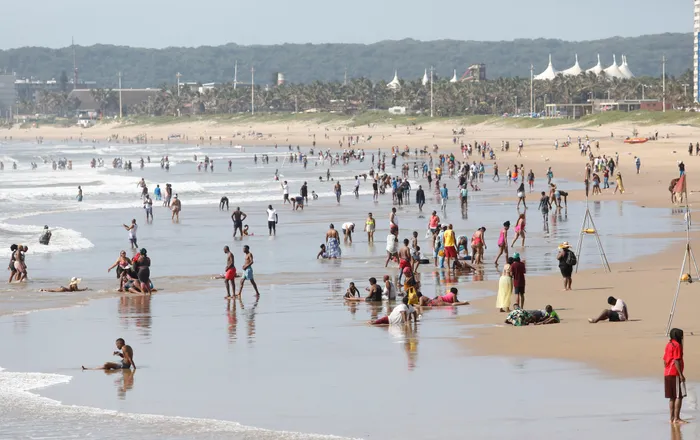Northern eThekwini beaches still E. coli infested, south beaches safe

Durban beaches buzzing with holiday makers taking advantage of the long weekend this week. File picture: Doctor Ngcobo / African News Agency (ANA)
Festive goers who flock to Durban for its warm oceans during the holidays should proceed with caution as beaches towards the northern part of the golden mile coastal strip in KwaZulu-Natal are still unsafe for use as recent test results show a high concentration of a bacteria called Escherichia coli (E. coli).
The water sources tested at various points along the uMgeni river also showed a high concentration of E. coli.
The measurement used to test the amount of E. coli in water is called colony forming units or CFU per 100 milliliters, which is done to see how quick bacteria develops.
The eThekwini Municipality partnered with a company called Talbot to conduct the testing.
The tests were conducted on October 20, during a time when the region was experiencing heavy rains.
It appears as though beaches far away from the Umgeni river are safe for use, as Point and Ushaka beaches tested clear.
Ushaka and Point beach were given an “excellent” rating, while south beach and north beach were deemed “acceptable”.

Battery beach and the country club beach were rated “poor”, with over 2,500 cfu/100ml in Battery beach and over 3,000 cfu/100ml at the country club beach.
Water tested at river sources gave even high readings of E. coli, with over 100,000 cfu/100ml’s found at all three points of testing.
The testing was conducted at the River on Riverside Road in Durban north, the Kingfisher Canoe Club and the river below the northern wastewater treatment works.
“The City would like to assure residents that their safety remains a priority. The maintenance and repairs of sanitation infrastructure is being expedited,” the Municipality said.
The Durban beachfront is arguably the City’s most popular tourist attraction during the festive season, with thousands wanting to wet their feet on the warm shores of the Indian ocean.
But fears among festive goers have grown in recent times, as the state of Durban beaches were deemed unsafe on several occasions following damages to its sewage infrastructure during multiple bouts of flooding.
The 2022 festive season saw the beachfront shut down for the most part due to high concentrations of E. coli, which stemmed from damages caused during the April floods.
IOL